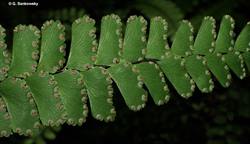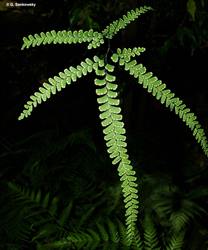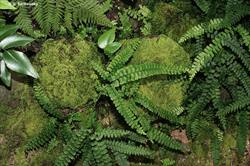Pteridaceae
Australian Tropical Ferns and Lycophytes - Online edition
Adiantum diaphanum





Adiantum diaphanum Blume
Link to Australian Plant Name Index for publication details and synonyms: https://id.biodiversity.org.au/name/apni/76428
Maidenhair Fern
Rhizome erect, c. 2 mm diam.; scales concolorous, golden brown, with entire margins and prominent apical seta. Roots with ovoid proliferous tubers to c. 1.5 mm long. Fronds tufted, to 36 cm long. Stipe to 18 cm long, smooth adaxially, scabrous abaxially. Lamina 1-pinnate, or 2 (–3)-pinnate at the base and 1-pinnate above, subpedate, hastate or triangular, 5–17 cm long, 2–13 cm wide, membranous; rachis flexuose, glossy, glabrous. Basal pinnae, when present, 1 or 2 (rarely more), narrowly triangular, 1–2-pinnate. Pinnules dimidiate, rectangular to subtrapeziform, becoming cuneate-flabellate in apical segments, sparsely to very sparsely setose; distal margins shallowly lobed, denticulate when sterile; veins dark brown near stalk, otherwise pale. Sori 1–10 along distal margins, usually 1 per lobe; soral flaps round to subreniform, setose (rarely glabrous), deeply immersed in the lobe. Spores ?64 per sporangium, yellow; perine scabrous; largest diam. (25.6–) 33.9 (–51.9) µm.
Widespread in QLD from CYP to northern NSW. Also widespread in Asia, Malesia, Pacific Islands and New Zealand.
Terrestrial or lithophytic in rainforest growing on a variety of substrates, usually in moist areas in watercourses. This species can spread adventitiously from its root system.
This is a commonly cultivated ornamental fern in tropical, subtropical and temperate areas. It is suited to cultivation in a shaded and moist part of the garden or in a greenhouse. It is suited to cultivation in the ground or in a container planted in a free-draining but moisture retaining terrestrial growing medium. A tidy plant can be produced by removal of old fronds once per year just prior to the emergence of new fronds in spring. New plants are readily produced from root offsets which will emerge from draininage holes in a pot or through the wall of a coir lined hanging basket.
Key to some Adiantum species of tropical Australia.
1a. Fronds pinnate = Adiantum philippense
1b. Fronds bipinnate or higher = 2
2a. Pinnules flabellate to rounded = 3
2b. Pinnules obliquely oblong to rhomboid = 5
3a. Soral flaps broadly attached to lamina and situated on the ends of lobes with incisions between them = Adiantum capillus-veneris
3b. Soral flaps reniform and narrowly attached to lamina and situated in incisions of the lamina margin with lobes between them = 4
4a. Rhizome long creeping, rhizome scales translucent with entire margins, plants stoloniferous and spreading, pinnae pale bright green when mature = Adiantum aethiopicum
4b. Rhizome short creeping, rhizome scales opaque with denitculate margins, not stoloniferous plants tufted, pinnae dark green when mature = Adiantum atroviride
5a. Rhizome long creeping, fronds scattered = 6
5b. Rhizome not long creeping, fronds tufted = 7
6a. Primary pinnae progressively reducing in length from base to apex of frond resulting in a triangular lamina = Adiantum formosum
6b. Primary pinnae equal in length resulting in an ovate lamina = Adiantum silvaticum
7a. Pinnae soft and membraneous with fine black hairs on the undersurface, root tubers present, often proliferous, stipe smooth = Adiantum diaphanum
7b. Pinnae herbaceous to coreaceous with white hairs, root tubers absent, not proliferous, stipe not smooth = Adiantum hispidulum
Field AR, Quinn CJ, Zich FA 2022 Australian Tropical Ferns and Lycophytes. apps.lucidcentral.org/fern/text/intro/index.htm accessed online INSERT DATE.
Field AR, Quinn CJ, Zich FA 2022 ‘Platycerium superbum’, in Australian Tropical Ferns and Lycophytes. apps.lucidcentral.org/fern/text/entities/platycerium_superbum.htm accessed online INSERT DATE.







